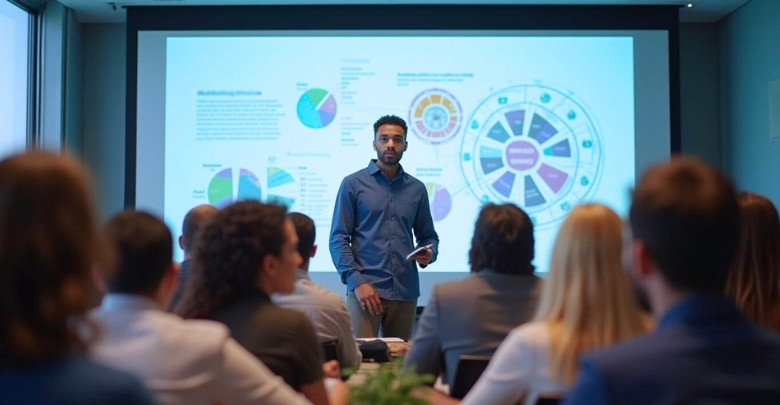In a conference presentation, the ideas and research are brought to life, the findings of the research are highlighted, and professional relationships are made. Any industry gathering requires this dynamic exchange of insights, whether it’s sharing breakthrough findings or highlighting best practices. But what is the purpose of a conference presentation and why does it matter?
At its core, a conference presentation aims to share knowledge, showcase research, and develop collaboration among participants. It keeps attendees informed about the latest trends, provides valuable feedback for presenters, and encourages innovation.
Moreover, it’s a golden opportunity to increase your credibility and expand your network. Ready to explore how this enriching experience fuels professional growth? Here’s more about its purpose and impact.
What is the Purpose of a Conference Presentation? Key Insights and Benefits
Conference presentations are dynamic opportunities to share expertise, develop collaborations, and drive innovation. They offer a platform for professional growth while keeping participants aligned with the latest industry trends. Let’s explore the key purposes of conference presentations and the incredible benefits they bring.
Unlocking Insights
Presentations at conferences often open the door to profound knowledge, awakening curiosity, and deeper understanding. By showcasing research or sharing industry-specific insights, they push boundaries in how we think and work. This helps participants adopt new approaches that can drive impactful results.
Countries like Canada, known for hosting diverse academic and professional gatherings, provide fertile ground for exchanging ideas. For instance, upcoming conferences in Canada offer platforms for experts to introduce new perspectives and spark discussions. Such opportunities inspire professionals to reshape their strategies and elevate their work.
Building Bridges
Connections made during presentations lay the groundwork for meaningful collaborations. They foster professional relationships, opening doors to partnerships that drive success. Whether formal or casual, these bonds often lead to fruitful opportunities in the future.
Audience engagement enhances communication, bridging gaps between researchers, professionals, and institutions. Shared discussions pave the way for innovative joint projects. Networking through presentations creates a vibrant community focused on mutual growth and progress.
Feedback Loops
Constructive feedback from peers sharpens your ideas and approaches. Presentations allow others to assess your work, offering valuable insights. This iterative process improves your research and strengthens your contributions to the field.
Engaging with experts challenges you to refine your methods and delivery. Their questions often lead to rethinking strategies for better outcomes. Such input not only enhances work quality but also fuels confidence in presenting ideas.
Increased Reputation
Presenting at a conference positions you as a thought leader in your industry. It highlights your expertise and professional dedication. This visibility significantly strengthens your credibility and creates lasting impressions.
Audiences respect individuals who share knowledge effectively and with confidence. These presentations showcase your ability to contribute meaningfully to the field. Enhanced recognition often leads to invitations for collaboration, publications, and speaking engagements.
Staying Ahead
Keeping pace with industry trends is crucial for staying relevant and competitive. Conference presentations expose you to advanced research and innovation. By attending or presenting, you position yourself at the forefront of your domain.
Being well-informed enhances your ability to anticipate changes and adapt strategies. Presenters gain firsthand exposure to advancements influencing their work. This awareness ensures continuous growth and alignment with industry evolution.
Confidence Catalyst
Public speaking is a skill honed through practice, and conferences are perfect venues for this development. Presenting enhances self-assurance while improving communication clarity. Over time, it refines your ability to engage diverse audiences effectively.
Facing a live audience pushes you out of your comfort zone, building resilience. Each successful presentation reinforces your confidence in expressing ideas. These experiences translate into improved performance across other professional settings.
Sparking Innovation
The energy of conferences ignites creativity through exposure to varied viewpoints and research. Presentations become breeding grounds for transformative ideas. Collaborative discussions often lead to revolutionary approaches and solutions.
The blend of academic rigor and practical applications fuels experimentation. Participants leave inspired to tackle challenges with renewed strength. This environment cultivates innovation, making conferences a vital driver of progress.
Career Leap
Presenting at conferences signals your commitment to growth and expertise. This visibility enhances your professional development by demonstrating your value. Employers and peers recognize your effort, often leading to new career opportunities.
Speaking engagements showcase your leadership potential and ability to inspire others. They validate your role as a proactive contributor in your field. The long-term benefits of presenting are evident in career advancements and personal achievements.
Who Gives Presentations at a Conference?
Conference presentations bring together a diverse range of speakers, each contributing unique expertise and perspectives. These presenters are carefully selected to align with the event’s theme and goals. Let’s explore the different types of individuals who often take the stage at conferences.
Academic Researchers
Researchers present findings from their studies, shedding light on critical topics within their fields. They often introduce innovative methods or results to inspire others. These presentations provide a platform to share ongoing work and seek valuable feedback. By showcasing their research, they contribute to advancing collective knowledge in their discipline.
Keynote Speakers
Keynote speakers deliver inspiring talks that set the tone for the conference, captivating audiences with their expertise. A hallmark of these sessions is the keynote speaker audience interaction, which creates engagement and makes the experience more dynamic. Their presentations focus on overarching themes, offering profound insights and a visionary outlook. By connecting directly with attendees, keynote speakers leave a lasting impression, ensuring the conference begins with energy and inspiration.
Industry Experts
Renowned professionals share practical insights and lessons learned from real-world experiences. Their presentations often focus on applied knowledge and industry best practices. Attendees benefit from actionable advice that addresses current challenges and opportunities. These talks bridge the gap between academic theory and practical implementation.
Educators and Trainers
Teachers or trainers share expertise designed to enhance skills or understanding in specific areas. Their presentations often include workshops or interactive sessions. These talks prioritize practical learning and provide tools for immediate application. By focusing on skill development, they empower attendees to grow professionally.
Entrepreneurs and Innovators
Startup founders and innovators present ideas or products that disrupt industries or address unmet needs. They often discuss challenges and successes in their journeys. These talks offer inspiration and insight into creative problem-solving. By sharing their stories, they motivate others to pursue entrepreneurial ventures.
Policymakers and Advocates
Policymakers and advocates present on societal, regulatory, or ethical issues relevant to the conference theme. They provide context and propose actionable solutions to challenges. Their talks encourage awareness and engagement on important topics impacting communities or industries. These presentations often lead to meaningful discussions and collaborative efforts for change.
How Does a Conference Presentation Benefit the Presenter?
There is more to conference presentations than just sharing knowledge. These experiences facilitate growth on a personal and professional level. Taking part in these valuable experiences has many benefits for presenters. Here are a few of them:
Establishing Expertise
Delivering a presentation highlights your expertise in your field, showcasing your knowledge to peers and industry leaders. This visibility enhances your reputation and positions you as a thought leader. Attendees view you as a reliable source of insights and innovation. The recognition gained helps open doors to collaborations and professional opportunities.
Expanding Professional Network
Presenting connects you with professionals who share your interests, creating opportunities for meaningful relationships. These connections often lead to collaborations, mentorships, or joint research. Conferences gather experts who can offer guidance or become future partners. Networking during such events builds a solid foundation for career growth.
Receiving Constructive Feedback
Presenters benefit from real-time feedback that refines their ideas and approach. Audience questions often reveal overlooked perspectives or improvements. Expert critiques enhance the quality of your work and its relevance to your field. This process fosters growth and strengthens your ability to deliver impactful insights.
Building Confidence
Speaking in front of an audience challenges you to communicate clearly and effectively. Each presentation builds your self-assurance in public speaking. Overcoming the initial nerves enhances your ability to engage and inspire others. The confidence gained carries over to other aspects of your professional life.
Staying Ahead of Trends
Preparing for a presentation requires a thorough understanding of the latest research and advancements in your field. While this ensures you stay competitive and informed, it’s equally crucial to avoid common errors in conference presentation that can undermine your efforts. Sharing insights effectively demonstrates your commitment to excellence and positions you as a leader. Staying ahead empowers you to adapt and influence industry trends with confidence.
What Role Does Networking Play in Conference Presentations?
Networking is a cornerstone of conference presentations, offering invaluable opportunities to connect with peers, experts, and potential collaborators. It creates meaningful relationships that can lead to future projects or professional growth. Here are the specific roles networking plays in conference presentations:
- Facilitates Collaboration Opportunities: Engaging with attendees can lead to collaborative research or joint ventures. These partnerships often help solve complex problems and innovate effectively.
- Builds Lasting Professional Relationships: Conversations at conferences lay the foundation for long-term connections. These relationships often turn into mentorships or valuable professional networks.
- Enhances Knowledge Exchange: Networking allows for the sharing of diverse perspectives and ideas. This exchange can enrich your understanding and inspire new approaches.
- Improves Visibility in the Community: Interacting with others during conferences raises your profile within your industry. Increased visibility often leads to invitations for further opportunities.
- Opens Doors to Career Advancement: The connections made during networking can lead to career-changing introductions. Many attendees find job opportunities or guidance through these interactions.
- Encourages Learning from Experts: Networking provides a chance to interact with seasoned professionals in your field. Their insights can enhance your expertise and direction.
- Strengthens Communication Skills: Interacting with diverse individuals during conferences refines how you articulate your thoughts. This improvement is invaluable for future professional interactions.
What are the Key Benefits of Engaging an Audience During a Presentation?
Engaging your audience during a presentation turns it from a monologue into an interactive and impactful experience. It creates connection, encourages feedback, and keeps your message memorable. Let’s explore the key benefits of audience engagement and why it matters for presenters.
Building a Connection
Interacting with your audience creates a sense of inclusion, making them feel valued and heard. This connection builds trust and rapport. A connected audience is more likely to stay attentive and absorb your message. It transforms the presentation into a collaborative experience, deepening its impact.
Enhancing Message Retention
Audience engagement helps reinforce your message, ensuring it resonates and remains memorable. Techniques like storytelling or Q&A encourage active listening. When attendees are involved, they are more likely to internalize your points. Engaged audiences leave with a clearer understanding of your content.
Encouraging Valuable Feedback
Involving your audience invites feedback that refines your delivery and content. Questions often reveal gaps or areas needing elaboration. This input is invaluable for improving future presentations and honing your skills. Feedback sessions also encourage collaborative discussions, enriching the experience for everyone.
Inspiring Participation
Active engagement creates a lively and participatory environment that energizes the room. Attendees feel more motivated to share their own ideas. This dynamic exchange of perspectives often leads to innovative solutions or insights. Presenters benefit from the collective wisdom of an involved audience.
Raising Confidence
Engaging with your audience builds confidence as you navigate live interactions successfully. Positive responses affirm the value of your message. Each interaction strengthens your ability to handle unexpected questions or challenges. Confidence gained during engagement enhances your overall public speaking skills.
FAQs About the Purpose of The Conference Presentations
Conference presentations are more than just speeches—they’re opportunities to share ideas, encourage collaboration, and drive professional growth. Below are five frequently asked questions to clarify the purpose and importance of conference presentations.
How Do Conference Presentations Promote Professional Development?
Presenting at a conference helps enhance public speaking skills, improve confidence, and showcase expertise. It’s a chance to receive feedback, refine ideas, and build your reputation within your field. These experiences significantly contribute to career advancement and personal growth.
Why Are Conference Presentations Vital for Knowledge Sharing?
They provide a platform to disseminate research findings, best practices, or innovative methods. Attendees benefit from exposure to new perspectives, while presenters contribute to collective knowledge. This exchange keeps industries evolving and supports a spirit of collaboration among professionals.
How Do Presenters Benefit from Audience Engagement?
Engaging with the audience allows presenters to gauge the impact of their ideas and adjust their delivery. Interactive sessions encourage valuable feedback, spark discussions, and build rapport. This involvement creates a more enriching experience for everyone involved.
Why Are Conference Presentations Important for Building Credibility?
Delivering a well-prepared presentation establishes you as an authority in your domain. It demonstrates dedication, knowledge, and the ability to communicate effectively. This credibility often leads to further opportunities like publications, collaborations, or invitations to future speaking engagements.
What Role Do Conference Presentations Play in Networking?
Presenting allows you to connect with peers, experts, and potential collaborators. Networking during and after your session develops professional relationships. These connections often result in joint projects, mentorship, or valuable insights that enrich your career and professional community.
Closing Remarks
Sharing knowledge, making connections, and inspiring innovation are all powerful outcomes of conference presentations. Professionals can fully utilize conference presentations to grow personally and professionally by understanding “what is the purpose of a conference presentation?”
Creating memorable experiences requires accurate preparation and engaging your audience. Mistakes in execution, however, can detract from your message and limit its impact. Presenters should embrace feedback, stay aligned with current trends, and focus on clear communication to maximize their effectiveness.
At the end of the day, these presentations are more than simply the delivery of information to inspire progress and build long-lasting professional relationships.








